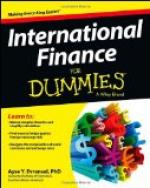of finance, in order to further what it believes to
be the political interests of the country. The
formation of the Six Power Group in China meant that
the financial strength of England and France had to
be shared, for political reasons, with powers which
had, on purely financial grounds, no claim whatever
to participate in the business of furnishing capital
to China. The introduction to the 1898 edition
of “Fenn on the Funds,” expresses the
view that our Government is ready to protect our traders
abroad, but only helps investors when it suits it
to do so. “If,” it says, “a
barbarian potentate’s subjects rob a British
trader we never hesitate to insist upon the payment
of liberal compensation, which we enforce if necessary
by a ‘punitive expedition,’ but if a civilized
Government robs a large number of British investors,
the Government does not even, so far as we know, enlist
the help of its diplomatic service. Only when,
as in the case of Egypt, there are important political
objects in view, does the State protect those citizens
who are creditors of foreign nations. One or
two other countries, notably Germany, set us a good
example, with the best results as far as their investors
are concerned.” Germany is often thus taken
as the example of the State which gives its financiers
the most efficient backing abroad; but even in Germany
finance is, like everything else, the obedient servant
of the military and political authorities. For
several years before the present war, the financiers
of Berlin were forbidden to engage in moneylending
operations abroad. No doubt the Government saw
that the present war was coming, and so it preferred
to keep German money at home. It is true that
Germany once shook its mailed fist with some vigour
on behalf of its financial interest when it made,
with us, a demonstration against Venezuela. But
it is at least possible that it did so chiefly with
a view to the promotion of the popularity of its navy
at home, and to making it easier to get the money
for its upkeep and increase from the taxpayers, already
oppressed by their military burden. In Morocco
questions of trade and finance were at the back of
the quarrel, but it would not have become acute if
it had not been for the expected political consequences
that were feared from the financial penetration that
was being attempted; and as has been already pointed
out, the financiers are generally credited with having
persuaded Germany to agree to a settlement on that
occasion.
In short, finance, if left to itself, is international and peace-loving. Many financiers are at the same time ardent patriots, and see in their efforts to enrich themselves and their own country a means for furthering its political greatness and diplomatic prestige. Man is a jumble of contradictory crotchets, and it would be difficult to find anywhere a financier who lived, as they are all commonly supposed to do, purely for the pleasure of amassing wealth. If such a being could be discovered he would probably be a lavish subscriber to peace societies, and would show a deep mistrust of diplomatists and politicians.




